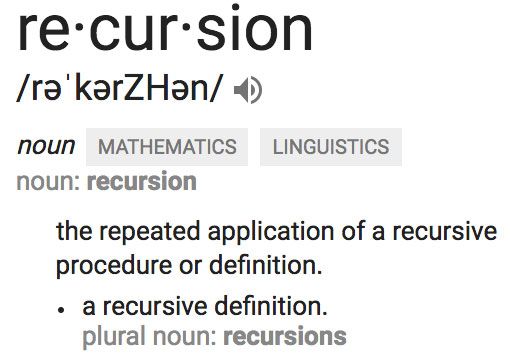What we talk about when we talk about recursion
This odd project centers on recursion in general and its role in our particular moment. Emerging phenomena – fake news, polarized politics and the rise of extremism, social engineering via algorithm, new constructions of gender, identity, history, the anthropocene and runaway climate change – all contain feedback loops which simultaneously reinforce and alter their nature, and us along with them. Emerging phenomena are proving the insufficiency of binaries and are giving way to new transpositions of self and world.
For these reasons, the notion of recursion is no longer just an esoteric programming joke – it is poised to become a new cultural trope. In the face of seemingly hopeless social, political, and environmental crises, reductio ad absurdum – situations being carried out to their absurd and perhaps monstrous logical conclusions – has become a common model, even if only as a way to cope.
The word “recursion” is increasingly serving as a shorthand for this model, used colloquially to signify dismay at the inevitable. Rather than a progressive politics of agency, or a throwback to a Gen-X style apathy, what seems to be emerging now is a curious form of active abdication. The reactionary machinations of politics, the determinism of algorithms, etc., seem to render us unable to solve or even escape our problems. This is giving rise to a new affect which is exemplified by recursion, the teleological equivalent of being stuck in a loop.
OK. So what really is recursion, then?
A long time in-joke among software engineers, recursion has quietly persisted like a weird echo that won't die – just ask Google about recursion and it will ask you, "Did you mean: recursion?"
If you're unfamiliar with the term, its definition contains an example:

Recursion is everywhere. It’s in the shape of the coastline, a thing whose whole is the same shape as its parts. It’s in the recipe for sourdough, which requires a bit of sourdough in order to begin. It’s in the way plants grow. It is fractals and rhizomes, in nature and in art. It’s in the geometricity of ancient Islamic patterns and the impossible architecture of M.C. Escher drawings. It is the Morton Salt girl carrying the Morton Salt girl, and every little Russian nested doll.
Yet, though recursion is solidly a part of our world, in some sense it threatens to go beyond it. Like the plausibility of an infinitely expanding universe, recursion brushes uncomfortably against infinity, evoking the monstrousness of the abyss beyond. We can scoff at the 3D printer that prints itself, but the notion stops being cute when we consider the same of artificial intelligence. For, if recursion permits a thing to be found in itself, and the thing itself is the ability to create – or to think – then where does that spiral staircase lead?
These, of course, are the silly preoccupations of people who’ve read too much sci-fi and wasted their youth on Monty Python or Rick and Morty. Recursion is just math, every bit as boring as addition and subtraction. The only thing that sets recursion apart is its ability to charm the overeducated into imagining there’s more to it.
But if that’s true, that’s enough to ensure there’s more to it.
Let’s return to the definition. That recursion's definition contains the words “recursive” and “definition” is not a mistake: the author wanted it that way. When you type “recursion” into Google, it gives you a playful, nonstandard reply because someone programmed it that way. Games are a common locus of recursion because programmers make games, and even mind games, like The Game (a game in which you play by merely remembering you are playing it), are haunted by recursive tactics.
Oddities like this are essentially guaranteed when it comes to recursion. People who’ve been tickled by the recursive can’t help themselves; something about it is so irresistible to them, it's almost perverse. It is revered to such a point that conventional people (dictionary authors, game makers, Google engineers) regularly break the rules on its behalf. Wittgenstein once wrote, “Let us ask ourselves: why do we feel a grammatical joke to be deep?” adding, “That is what the depth of philosophy is.” It's stupid. It's absurd. It breaks its own rules. Deep or not, that’s what recursion is. It provides a shorthand to explain that strange, complex, layered ineffability that persists, that confounds, that surprises in boring places, that implies such sense and order as to border on meaninglessness.
This publication is not a 3D printer, but it is a 2D printer, and it is learning. Right now, it can’t speak for itself, let alone think, but we’re trying to breathe some life into it. We suspect recursivity and self-referentialism – “the meta” – are what will eventually cause it to recurse itself and come sputtering to life. Or maybe we thought this sounded so delightfully absurd that we couldn’t help ourselves.
